WhatsApp: +1-416-435-0972 simon.chambers@actalliance.org
COP28 Press release: media stunt- house of cards collapse to highlight crumbling climate financial architecture
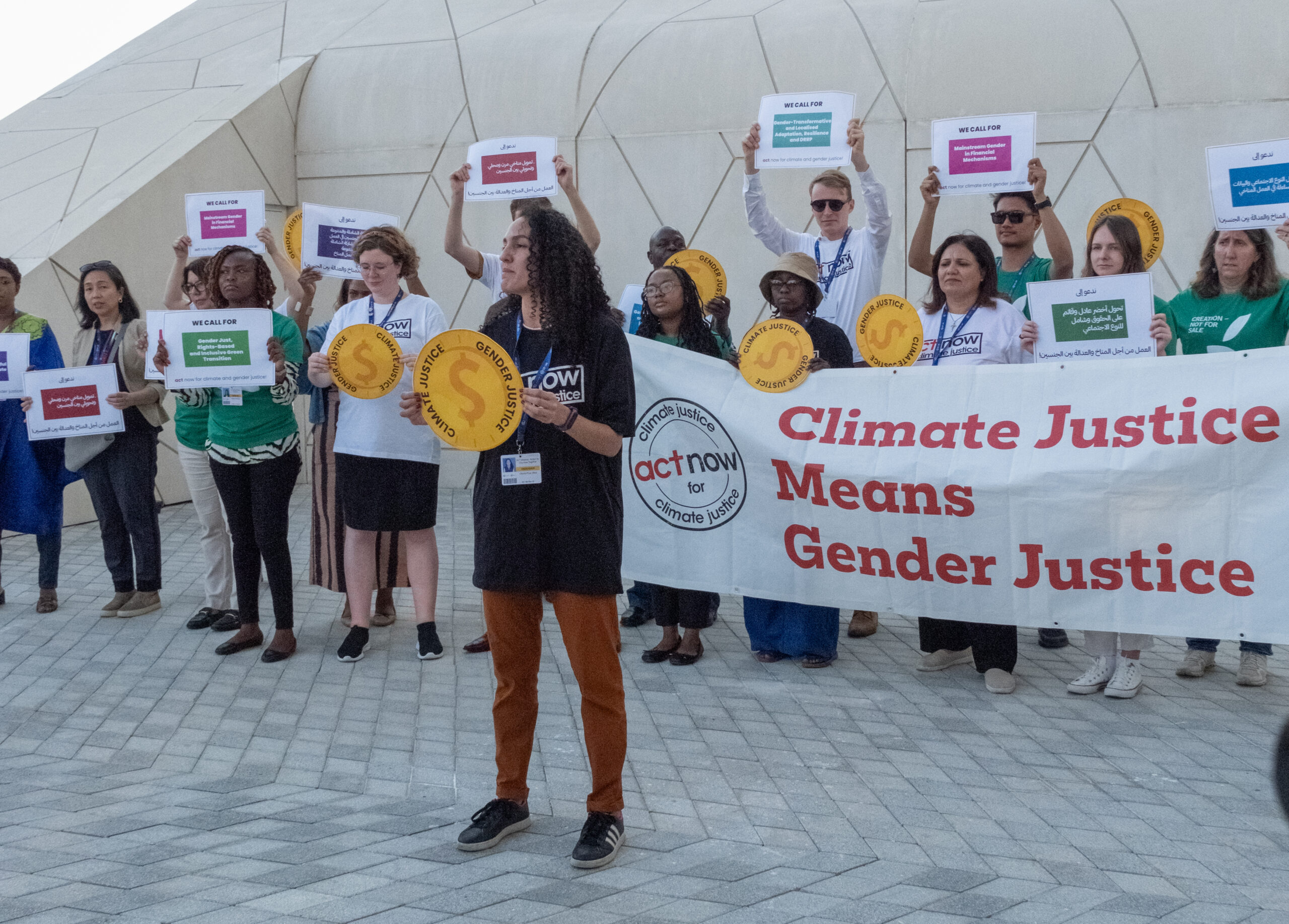
WhatsApp: +1-416-435-0972 simon.chambers@actalliance.org

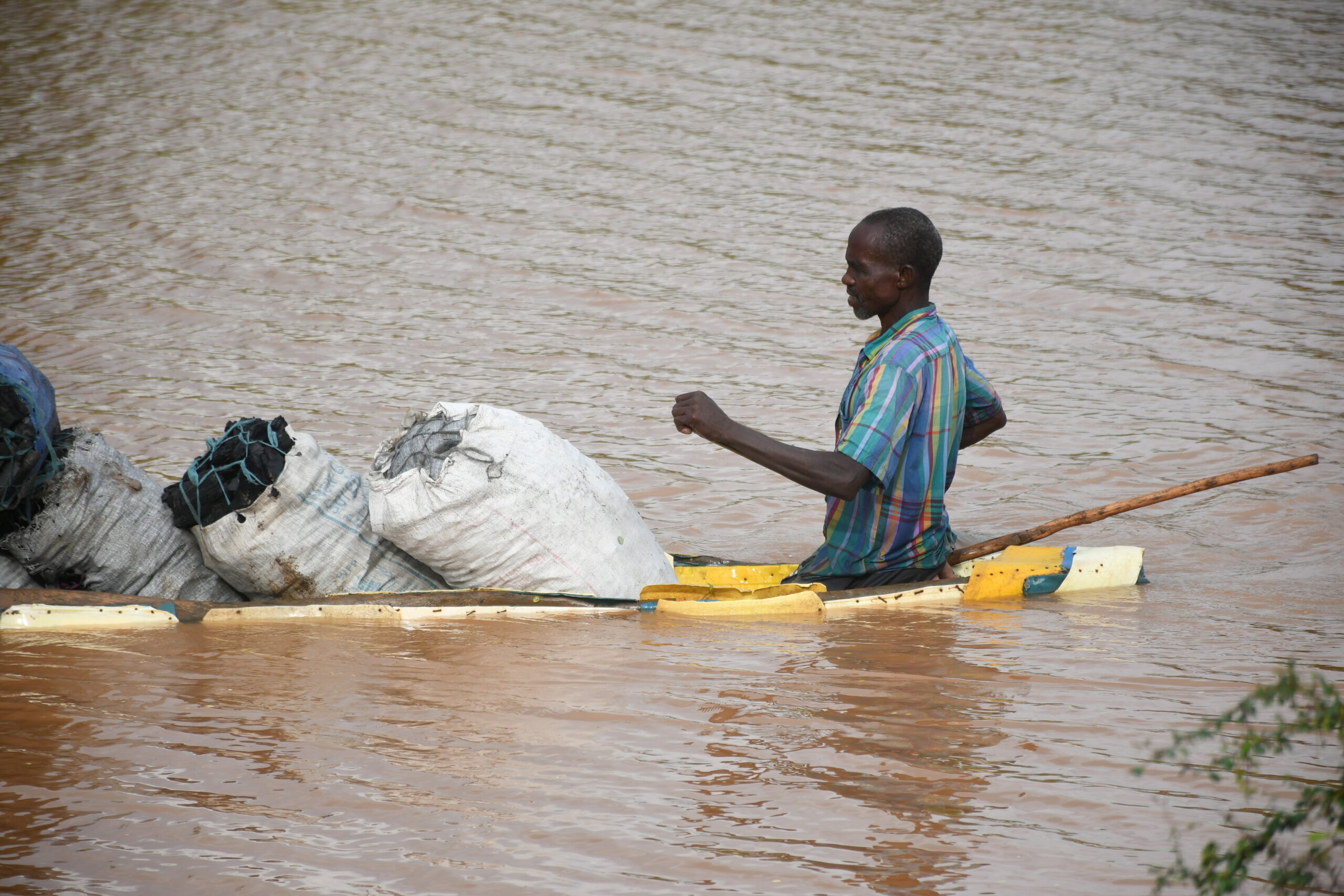
By Vincent Ondieki
The World Meteorological Organization reports that increasing temperatures and sea levels, changing precipitation patterns, and more extreme weather are threatening human health and safety, food and water security, and socio-economic development in the Horn of Africa. They further note that climate variability and climate change are major obstacles to resilience in the Horn of Africa, where increasing temperatures and shifting rainfall patterns are already affecting economic growth, livelihoods, food security, health, and ecosystems.
Due to El Nino, devastating flash floods have killed at least 111 people, including 16 children, across the Horn of Africa in recent weeks. More than three-quarters of a million people have been displaced and the rains show no sign of slowing. In Kenya’s northern counties and capital, Nairobi, unrelenting rainfall has led to widespread flooding. An estimated 80,000 people have been displaced or marooned in this area alone, and a further 46 have died since the beginning of the rainy season in September. Fatalities and missing persons are being reported on an almost daily basis.
Save the Children reports that heavy rainfall in Somalia and the Ethiopian highlands has left the central Somalia town of Beledweyne completely submerged. The Shabelle River burst its banks, forcing about a quarter of a million people, a full 90 percent of the population, from their homes. Across Somalia, eight children were amongst 32 people who are known to have died in the floods, with close to half a million displaced across the country. In Ethiopia, at least 33 people, including eight children, have died in the floods. Most drowned while trying to flee the devastation caused by the ongoing rains.
Ironically, the El Nino rains come on the heels of the worst drought in this part of Africa in 40 years, a drought which itself followed five failed rainy seasons. The droughts and lack of rain had already decimated livestock and crops, pushing the region to the brink of famine. These weather events so cruelly following each other illustrate the extreme and irreversible impacts of climate change on already vulnerable communities in the Horn of Africa and the resulting losses and damages that vulnerable communities suffer.
Thankfully, at COP27 parties agreed to establish a funding arrangement for losses and damages such as these. The commitment to a Loss and Damage Fund represents a renewed commitment to supporting local, rural, and vulnerable communities most affected by the climate crisis.
At both the first Africa Climate Summit and the Africa Climate Week this past September there was a resounding call for the operationalization of the Loss & Damage Fund – including setting up a board to guide its directions. The COP28 transition committee has developed proposals for the fund on governance structure, replenishment, and accessibility.
What happens in and beyond COP28 in Dubai must make loss and damage funds accessible to vulnerable communities. This is critical for climate justice and rebuilding trust, so that communities and nations can rebuild sustainably. If not, options exist to double commitments to finance adaptation to avoid occurrences of losses and damages. This is my wish for COP28.
Vincent Ondieki is an Environmental Governance and Climate change specialist who has worked nationally (in Kenya) and continentally (in Africa). He recently started working with ACT Alliance on climate justice issues in Africa.
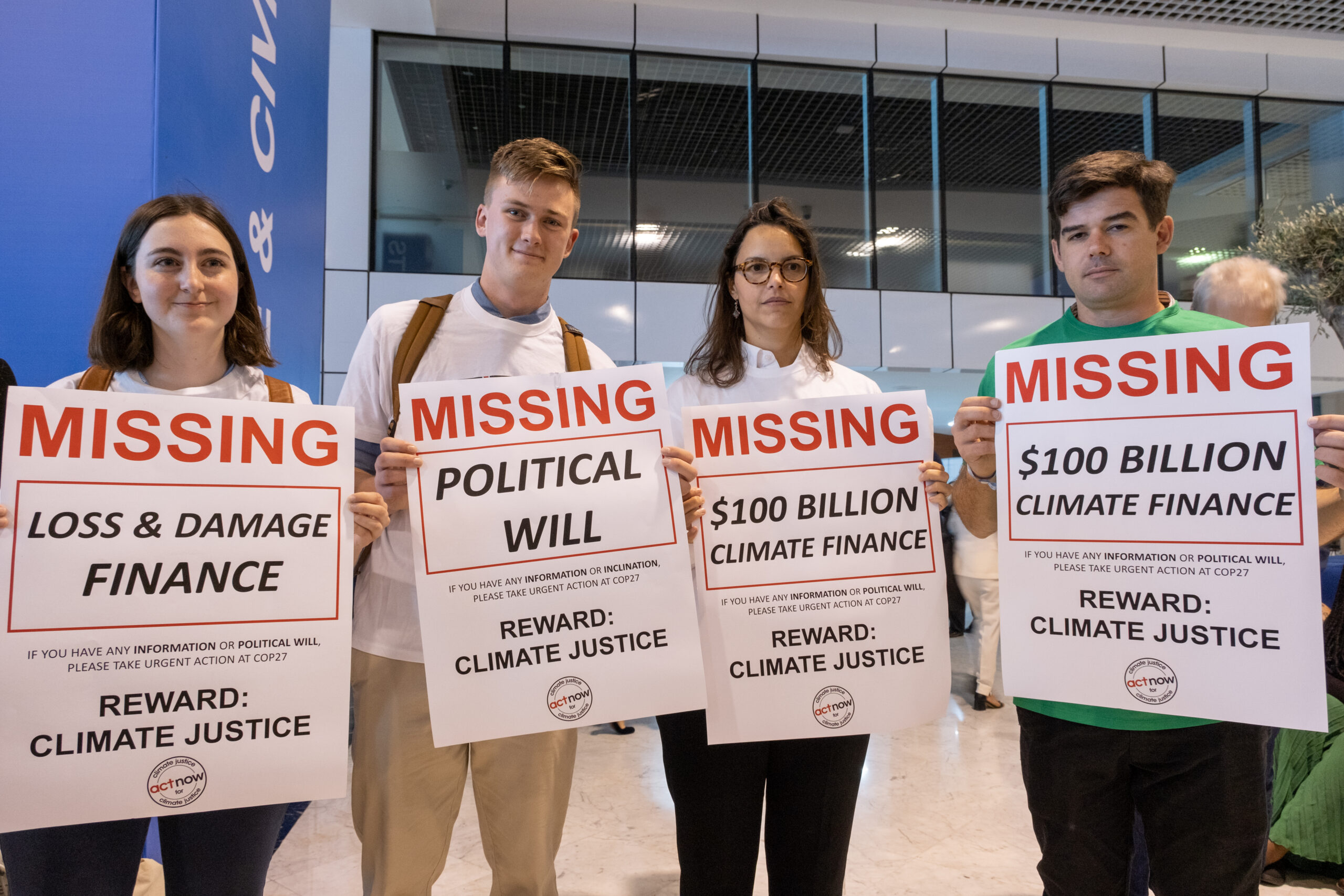
Climate crime scene media action
Time: 5th December 2023, 11h30
UPDATED Location Action Zone 9 (near the main entrance)
This visual stunt hosted by ACT Alliance and Don’t Gas Africa looks at a climate crime scene, with the outline of a body on the ground. But who is the victim? On energy day at COP28, join us to hear from vulnerable communities facing the brunt of the impacts of climate change, which speaks to the urgency of phasing out fossil fuels forever.
Powerful advocates from around the world will communicate how climate change disproportionately impacts communities across Africa and the Global South, who have done the least to contribute to climate change but are facing the worst of its effects.
Media Contact:
Simon Chambers, Director of Communications, ACT Alliance
WhatsApp: +1-416-435-0972 simon.chambers@actalliance.org
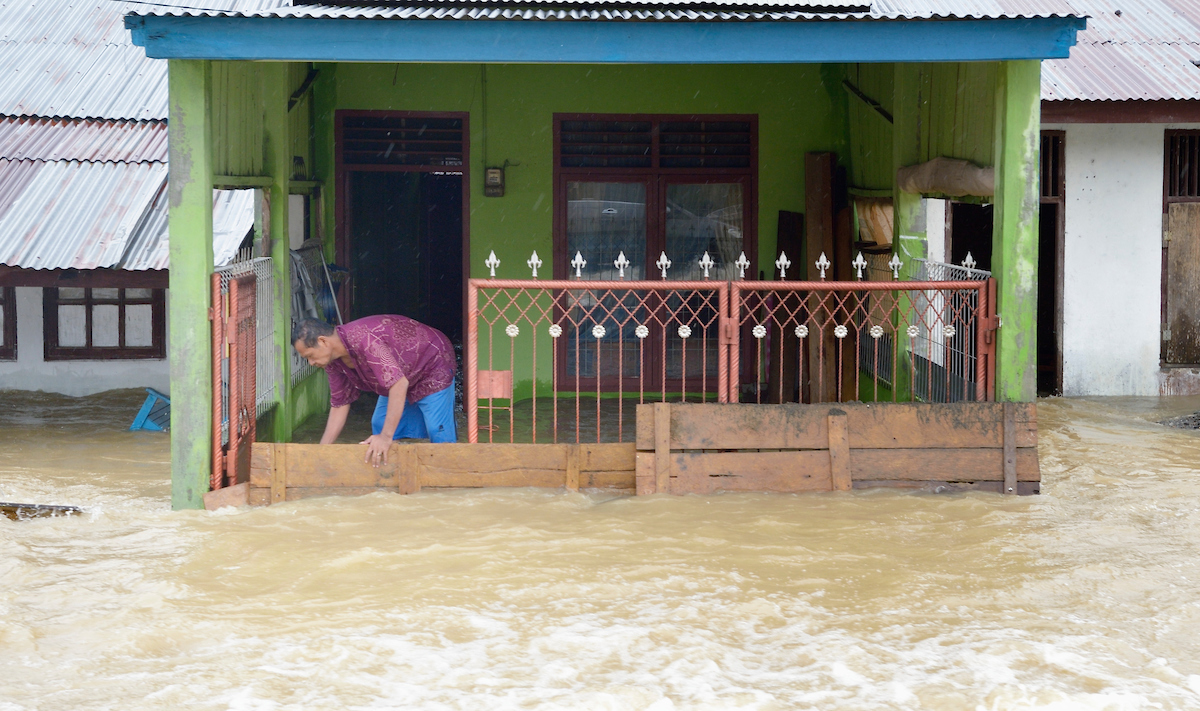
By Niko Humalisto
The distribution of the $100-billion-dollar climate finance commitment sparks competition among developing countries vying to be primary recipients of support. Notably, many African least developed countries (LDCs)
haven’t received aid from the key UN fund for climate action. Prioritising these limited finances for actions yielding the most benefits aligns with the interests of countries mobilising these funds. Central to this prioritisation is the concept of particular vulnerability.
In climate negotiations such as COP28, nations often highlight their vulnerabilities: the Arabian Peninsula faces extreme heat, island states are grappling with rising sea levels, and countries with savannahs are at risk of desertification. Consequently, there is growing competition to establish vulnerability to increase the chances of being eligible for climate finance for mitigation, adaptation, and loss and damage in future.
The competition for finance is partly due to scientific ambiguity. Vulnerability lacks a singular definition and can vary in terms of duration (long or short term), geographic scale, and an emphasis on societal, technological, or natural causes of vulnerability. Different scientific criteria lead to inconsistent results when answering the question of whether climate finances are largely targeted to vulnerable countries. Since a scientific consensus might not soon emerge, a political solution becomes imperative.
Vulnerable or particularly vulnerable nations
However, defining vulnerability politically remains not only ambiguous but controversial. The Paris Agreement identifies Lesser Developed Countries (LDCs) and Small Island Developing States (SIDS) as particularly vulnerable. The Bali Action Plan, established at COP13, designates Africa as “most vulnerable” alongside SIDS and LDCs. The original 1992 convention on climate change outlines various criteria affiliated with biophysical conditions, such as lowland coastal areas prone to floods or areas with high desertification risk as particularly vulnerable to the adverse effects of climate change. Despite attempts to differentiate between vulnerable and particularly vulnerable nations, all developing countries are eligible for climate funding.
As negotiations proceed for the new quantified collective climate finance goal and the establishment of modalities for the Loss and Damage Fund, donor countries have noted that some Gulf states already have a higher GDP per capita than they do. This poses a challenge to a more than thirty-year-old division of donors and recipients. Many developing country groups strongly oppose this challenge and emphasise developed nations’ historic responsibility for climate change and corresponding responsibility to rectify it. The ambiguity in both scientific and policy realms impedes the creation of meaningful mechanisms to delineate eligible and non-eligible countries.
Focus on local leadership and vulnerable populations
For civil society organisations dedicated to promoting climate justice, having a position on this issue—a thorny, cross-agenda debate—is crucial. One approach is to emphasize local leadership in climate action, recognizing that when it comes to vulnerability, disparities within countries often surpass those between countries. ActAlliance also stresses targeting vulnerable population groups for financial aid, such as Indigenous people, persons with disabilities, or smallholder farmers. There is no scientific ambiguity as to whether these groups are vulnerable or not. Another avenue involves not committing to pre-established boundaries on particular vulnerabilities, opting instead to evaluate problems on a case-by-case basis as modeling technologies advance.
We must also acknowledge that economic prosperity, climate change, and vulnerability are dynamic processes which require evolving criteria for financing eligibility. Insisting on robust differentiation mechanisms between countries based on vulnerability at this stage might do more harm than good. This is especially the case when there are existing avenues to channel financial resources into combating the climate crisis without increasing geopolitical tensions.
Niko Humalisto works as a leading advocacy specialist for ACT Alliance member the Finnish Evangelical Lutheran Mission and holds a title of an adjunct professor in the University of Eastern Finland. Apart from his work in advancing climate finances and circular economies, he volunteers in the bicycle workshop in Turku, Finland.
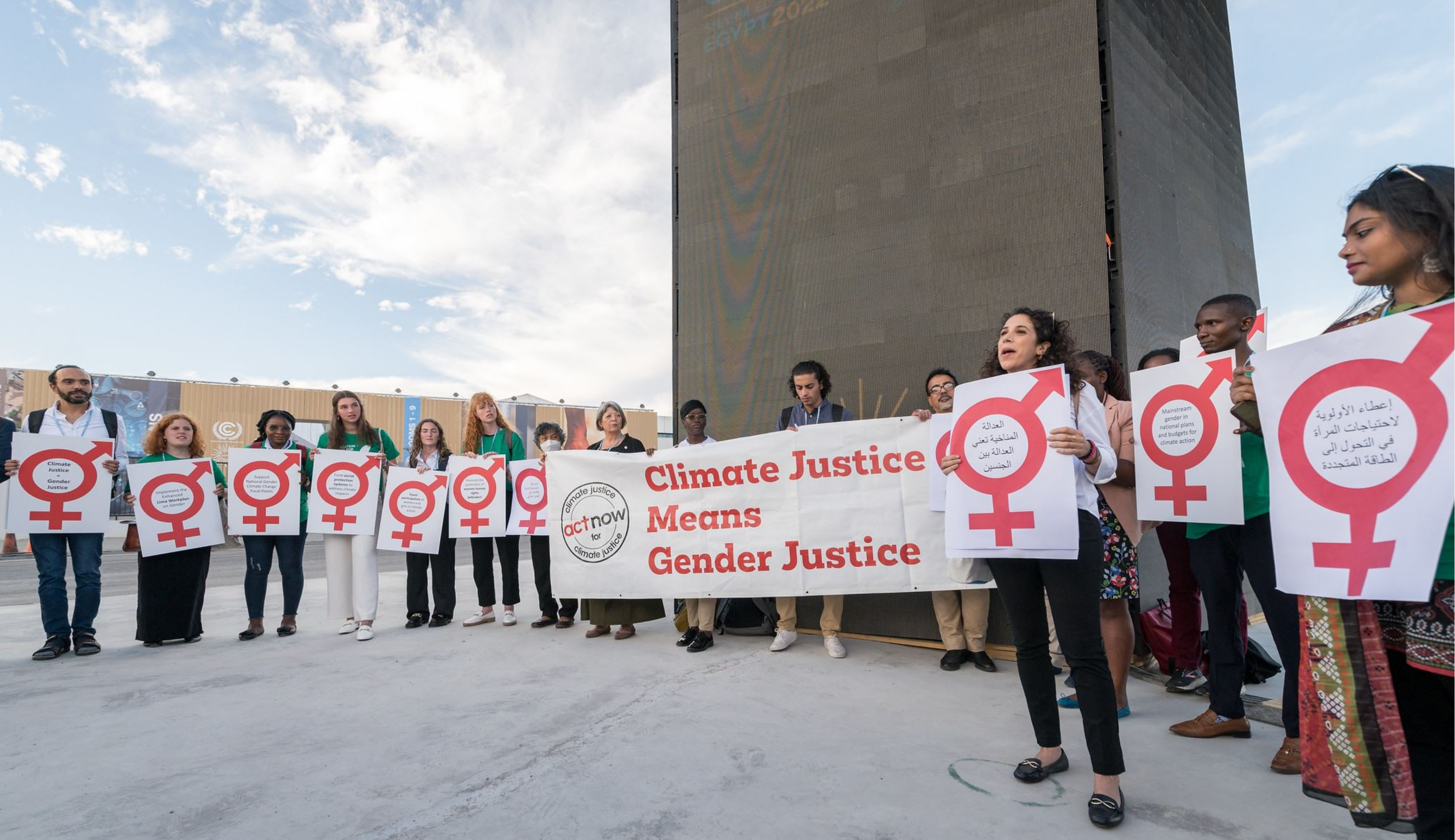
Two sides of the same coin: Climate and Gender Justice
Dubai, UAE- Climate justice and gender justice are two sides of the same coin – there can be no climate justice without gender justice. The climate emergency is not gender neutral. Women and girls in all their diversity are on the frontlines, often first and worst impacted by the climate crisis.
Research has shown that women and girls are 14 times more likely to die in a disaster than men, and we know that many disasters are a result of the climate emergency. As these disasters get more frequent and severe as global temperatures continue to rise, there is a risk that gender inequalities are exacerbated, unless gender-transformative action is taken, including in climate finance.
Extractive economic models, human rights and land violations, and structural gender barriers, require transformative and interconnected struggles for justice.
ACT Alliance has released a new report today Climate finance and gender: Lessons from Nordic efforts to integrate gender equality in climate-related development finance. The report’s recommendations to the Nordic countries include advocacy, tracking of finance with a gender lens, that transformative gender approaches be used and more. The report can be downloaded here.
ACT Alliance calls on COP28 to:
Quotes
Gloria Pua Ulloa, SEDI Asociacion Civil, Argentina “There’s no climate justice if women and girls, in all their diversity, are not included in all decision-making processes related to climate change.”
Hanna Soldal, Act Church of Sweden, Sweden: “Gender justice and climate justice are two faces of the same coin. Women and girls are 14 times more likely to die from climate induced disasters than men. There can be no climate justice without gender justice.”
Christina Cosby, Presbyterian Church of the USA “Youth, Indigenous Women, and local communities, most affected by climate change, offer valuable wisdom for innovative solutions. In climate finance at COP28, their engagement must move beyond ‘involvement’ to meaningful action for a more equitable and fruitful policy. Drawing on our faith traditions, they guide us by understanding our past, have the key to where we need to go, and the wisdom on how to get there. Climate Finance and Gender Justice are two faces of the same coin—you cannot have one without the other.”
Media contact
Simon Chambers, director of communications, ACT Alliance
WhatsApp: +1-416-435-0972
Email: simon.chambers@actalliance.org
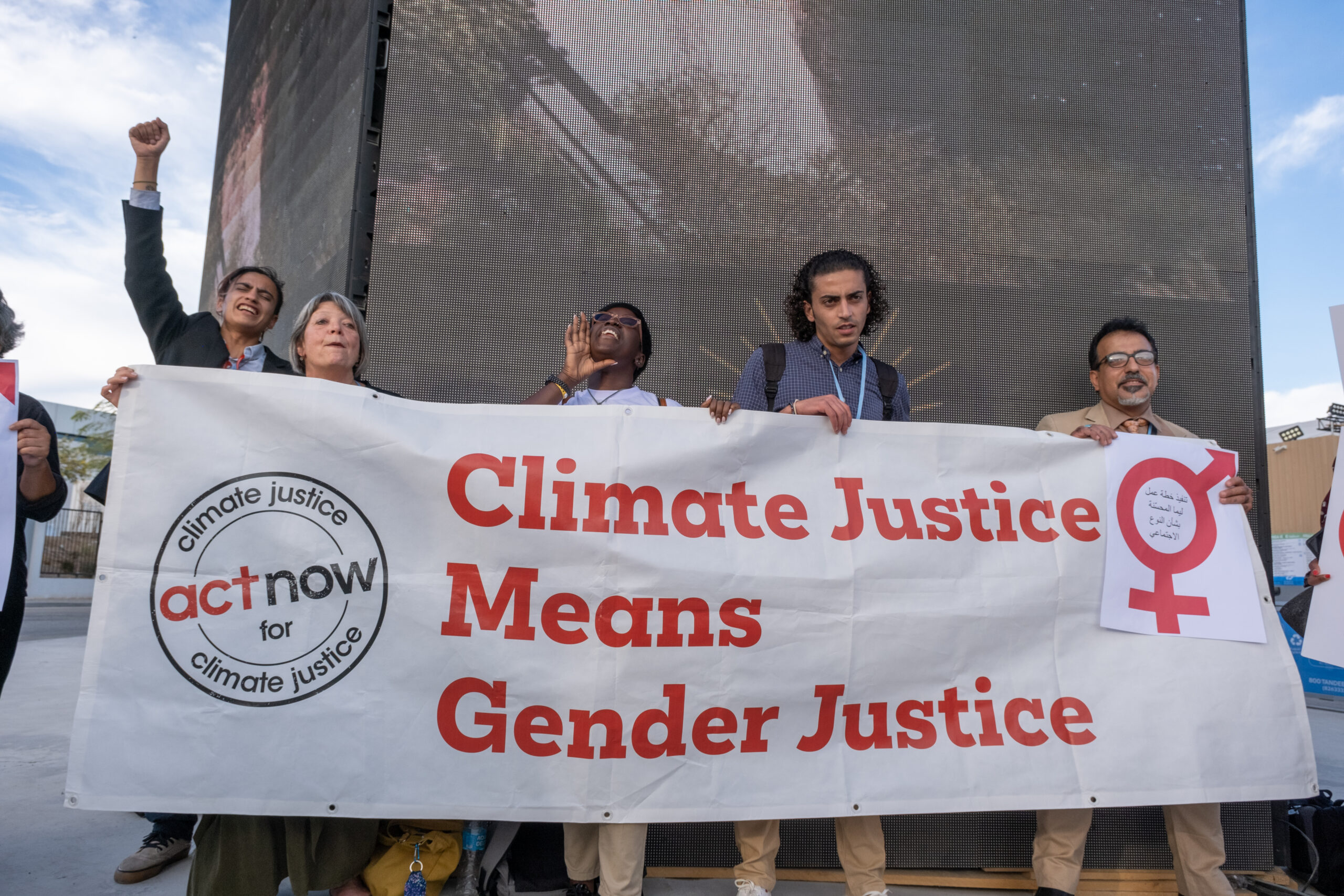
Time: 4th December 2023, 16h00
Location UPDATED: Action Zone 9 (B1 near the entrance)
This visual stunt will showcase calls for critical investment in gender-transformative climate finance.
The climate emergency is deepening gender inequalities. Extractive economic models, human rights and land violations, and structural barriers related to finance, education and health services, contribute to women and girls being 14 times more likely to die in a disaster than men.
Powerful advocates from around the world will communicate how climate and gender justice are two sides of the same coin, and collectively call for gender-transformative and rights-based climate adaptation, finance, mitigation and disaster risk reduction
Interviews can be made available with:
Media Contact:
Simon Chambers, Director of Communications, ACT Alliance
WhatsApp: +1-416-435-0972 simon.chambers@actalliance.org
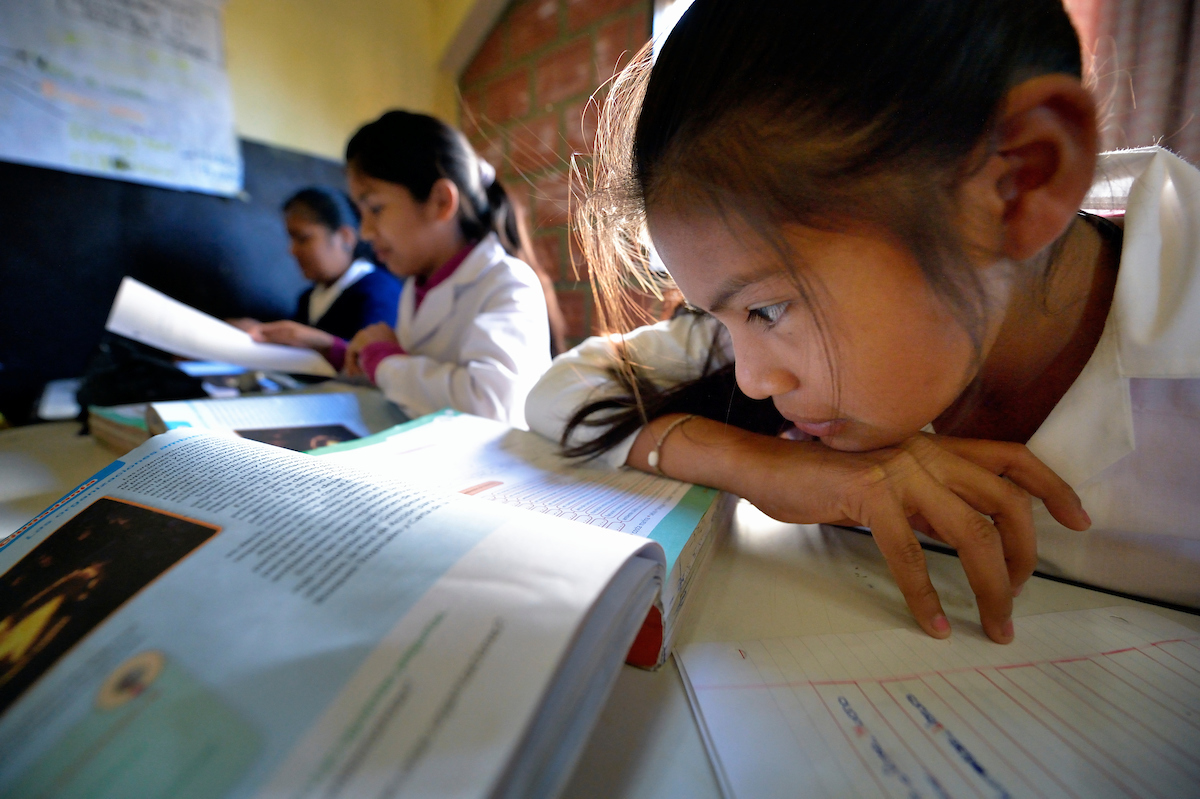
By Gloria Pua Ulloa
Climate change is increasing extreme weather events and has significant impacts on both ecosystems and people’s lives. Droughts, hurricanes, floods, and fires affect millions of people in Latin America each year,
jeopardizing food sovereignty and leading to significant migratory movements in the region.
The extractive economic model and deforestation promoted by the hegemonic economic model threaten the continuity of rural, indigenous, and farming communities. These communities not only face challenges in their agroecological food production methods but also risk expulsion from their territories. Although there are no official figures indicating the number of people mobilizing in the region due to climate disasters, some estimates suggest that without concrete actions, millions of people could be forced to leave their territories due to climate impacts.
In the province of Misiones, Argentina, where the Evangelical Service of Diakonia (SEDI, an ACT Alliance member) focuses its efforts and supports groups of farming families, community members speak of how critical the situation is due to prolonged drought and forest fires. Misiones is one of the few provinces in the country characterized by a warm subtropical climate without a dry season. Yet unusually long periods of drought are beginning to affect the region.
Because of this, many of the farming and indigenous families supported by SEDI have lost vegetable and crop yields. The impact is so severe that they have been unable to preserve seeds for the next annual planting season. This significantly affects their strategies for feeding themselves and their communities, their primary means of resilience during periods of economic crisis such as the one currently affecting the region. Some community members say that they are in an even more pressing situation than during the worst part of the COVID-19 pandemic.
The effects of climate change can be observed throughout the region. This underlines the need for urgent measures to curb the impacts of a changing climate and implement the loss and damage fund. The countries that have contributed the least to climate change are the ones most affected by its effects and require greater efforts for adaptation. Historical contributors to the increase in global temperature should bear the responsibility to contribute in terms of loss and damage, mitigation, and adaptation to protect the most vulnerable populations.
Climate change also contributes to the growth of extreme poverty in the region. Women, girls, and young people will be the most adversely affected if the situation worsens. Historically, they have borne the brunt of economic inequalities. The worsening of the crisis hampers their chances for a dignified and fulfilling life.
Our call is for states at COP28 to express their genuine commitment to climate justice and act now!
Gloria Pua Ulloa is a sociologist and works as Gender Justice and Youth Programme officer at the Evangelical Service of Diakonia -SEDI- in Argentina.
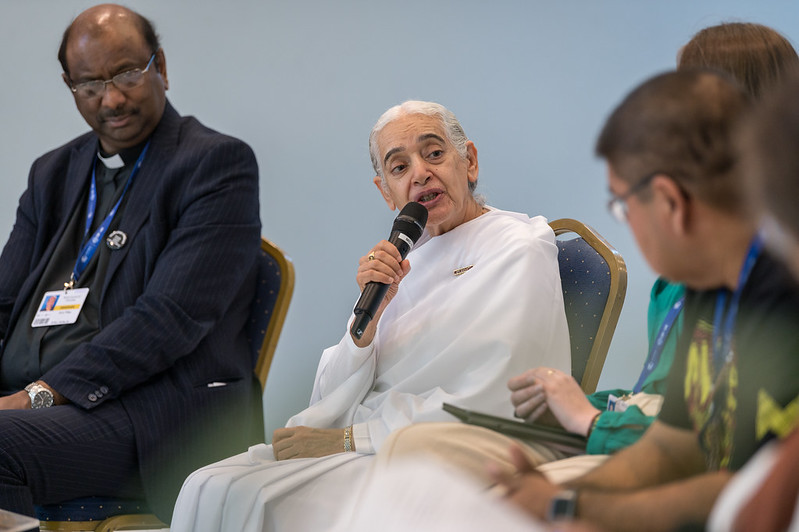
3 December 2023
FOR IMMEDIATE RELEASE
MEDIA ADVISORY
Dubai, United Arab Emirates: People of faith have been engaging in climate justice work for decades. Over 150 people of faith from around the world came together at the Interfaith Liaison Committee’s Talanoa dialogue on November 30 to discuss the three questions of a Talanoa: Where are we at, where do we want to go, and how do we get there in our work for climate justice at COP28.
As the World Leaders’ Summit has wrapped up, the ILC is working on its call to the COP for increased action to achieve climate justice and help keep global temperature rise to under 1.5C.
People of faith (Christian, Muslim, Sikh, Brahma Kumaris, and many others) bring the experiences of communities on the front lines of the climate emergency, they bring a moral dimension to the debate, and they also bring technical expertise through their engagement in combating climate change and in climate justice advocacy.
85% of the world’s population ascribe to a faith tradition, and faith communities are part of all communities in the world. They work as part of these communities together with local leaders and communities to address the impacts of climate change.
The Interfaith Liaison Committee to the UNFCCC brings together faith constituencies working to achieve climate justice to raise their voices together and share their stories from their traditions and experiences around the world.
What: Calls from people of faith from around the world for concrete action at COP28 towards achieving climate justice for the most vulnerable, and sharing stories of the impacts of climate change in communities around the world.
Who:
Sister Jayanti Kirpalani Additional Administrative Head of the Brahma Kumaris
Rev. Chebon Kernell, Indigenous, World Council of Churches
Ms. Lucy Plummer from youth from Soka Gakkai International
Mr. Harjeet Singh, head – global political strategy, CAN international
Ms. Valériane Bernard, Brahma Kumaris representative to the United Nations, Geneva- Moderator
Where: Press Conference Room 2 Zone B6 building 77 and online
When: Monday, December 4, 2023 13:30-14:00 Dubai time
Why: Faith communities bring concrete experiences of the impact of climate change on the most vulnerable people, including women and girls in all their diversity and people on the move, who have done the least to cause climate change and are facing the brunt of its impacts. Faith groups are on the front lines, responding to climate change through mitigation, disaster risk reduction, adaptation, and more.
# # # # #
MEDIA CONTACT
Simon Chambers- WhatsApp: +1-416-435-0972, Email: simon.chambers@actalliance.org
Director of Communications, ACT Alliance
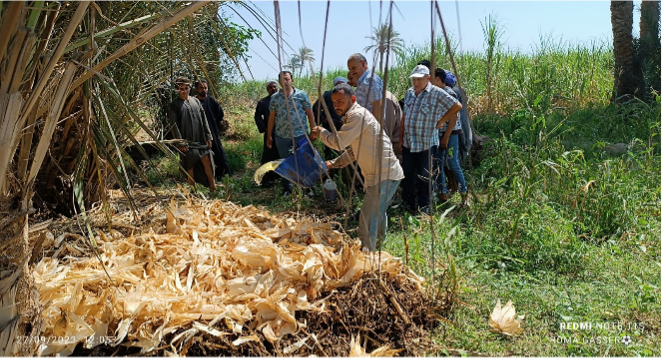
By Dr. Nahed Ayoub, Ph.D.
Climate change is a pressing challenge for all countries across the globe, including Egypt and the MENA region. Egypt is already suffering from water scarcity, and climate change exacerbates this problem. Rising temperatures and changing precipitation patterns lead to more frequent and severe droughts, intense heatwaves, and flooding in coastal areas. This has a devastating impact on agriculture, food security, human health and well being. Moreover, the region’s unique ecosystems, including coral reefs, mangroves, and wetlands, are under threat due to the impact of climate change on cultural heritage, natural beauty, and the economy.
The bishopric of public and ecumenical services (BLESS), the developmental arm of the Coptic orthodox church in Egypt, has two interventions related to adaptation and mitigation of climate change. The agriculture program focusses on small farmers, and the environment program targets people living in poverty in areas all over Egypt.
The rural programme empowers marginalised groups of smallscale male and female farmers. It introduces knowledge and skills about new techniques that lead to greater production, more rewarding economic returns, and that preserve environmental balance. The programme also addresses interrelated impacts on climate and fresh water. It establishes eco-friendly agricultural practices and supports smallscale farmers with machinery and supplies to ensure better land productivity, crop efficiency, lower costs, and environmental maintenance.
The environmental programme improves the conditions of communities living in poverty to develop an environment free of pollution. BLESS believes that each person has the right to live in a clean and healthy environment. This programme ensures sustainable development and preserves environmental rights such as adequate, clean water, for future generations. This is achieved through encouraging positive environmental attitudes and behaviours, developing solutions and alternatives for environmental problems and promoting the use of low-cost renewable energy technology. The programme also increases community resilience by fostering adaptation to the impact of climate change.
COP28 is crucial in addressing the effects of climate change on Egypt and other countries. Key issues include reducing greenhouse gas emissions to limit global warming to 1.5 degrees Celsius above pre-industrial levels, transitioning to low-carbon economies, and increasing adaptation finance.
Developing countries such as Egypt and others in the MENA region need significant financial and technical support to build resilience. This will require investments in water management, agriculture, and infrastructure. Decisions at COP28 can ensure a sustainable and resilient future for the region. It is essential that all countries work together to reduce emissions, support adaptation, and build a more sustainable and equitable world.
Dr Nahed Ayoub, an ACT COP28 Delegate, has a Ph.D. in water management, a master’s degree on the impact of global warming on food security, and a professorial master’s of gender and development. She is a BLESS program advisor on environmental, rural, and other development programs.
The ACT Alliance expresses profound concern over the ongoing atrocities in Palestine and Israel, which have far-reaching consequences for the entire region and, indeed, the world. On October 7, 2023, Hamas killed 1200 and kidnapped hundreds of Israelis in a violent organized operation. As a reaction, the government of Israel has launched one of the most atrocious military attacks on Gaza, affecting its more than 2.2 million inhabitants.
According to UNHCR to date there are 1.7 million displaced men and women, boys and girls in Gaza. More than 14,800 men and women, boys and girls, journalists, doctors, humanitarians, and religious leaders, have been reported killed. Thousands of people are still missing, and more than 2000 are believed dead under the rubble.
The Israeli airstrikes severely damaged civilian infrastructures. This includes hospitals, places of worship, UN-led facilities, schools, and private residences. According to the World Health Organization (WHO), the Gaza Strip is wrestling with an intolerable situation exacerbated by airstrikes and a severe shortage of fuel, water, and food, alongside restricted access to medical facilities and supplies.
Violence has also erupted in the West Bank and southern Lebanon. Hundreds of Palestinians have been killed and more than 2500 have been arrested. Our members and UN- OCHA report that episodes of violence by settlers against Palestinians are on the rise and their human rights are being violated.
ACT Alliance, a global network of more than 150 faith-based organisations operating in more than 120 countries, call for an immediate ceasefire. We call on governments believing in humanitarian law and human rights, to uphold the rights of civilians enshrined In the Geneva Conventions.
We welcome the release of women, girls, men, and boys who were captured by Hamas, as well as the Palestinian children and women prisoners held by Israel. However, we stress the urgency of stopping all arbitrary and unlawful detentions. We call for the immediate release of all unlawfully detained individuals and urge the liberation of all remaining hostages held by Hamas.
No “humanitarian pause”, unilateral “Safe zone” or partial truce are acceptable sustainable solutions. The only solution to this tragic war is a long-lasting ceasefire. Given the outrageous humanitarian situation in the Gaza Strip, more support to the civilian population needs to reach those in need. For this reason, we call on all governments to advocate for all borders to be open to humanitarian assistance operations. We stress that this is key for those requiring urgent medical assistance to be allowed to reach East Jerusalem’s medical facilities. Currently, more than 600 cancer patients cannot receive treatment, this includes paediatric patients.
We find solace in the solidarity shown by millions across the world to those affected by this war and we join those calls for justice.
We express our support and solidarity to our colleagues, our members and the ACT Palestine Forum who are on the frontlines of humanitarian relief operations and have lost family members, colleagues, homes, places of work and worship. We join our voices to the millions worldwide fervently calling for an immediate ceasefire and an end to the unlawful occupation of Palestine by Israel.
We call on the international community and all international relevant bodies to intervene immediately and to begin the necessary investigations to ensure that those responsible for any violation of international humanitarian law are held accountable. We also call on the international community and bodies to address the root causes of the Israeli and Palestinian conflict and we urge all stakeholders to engage in a constructive and open dialogue to ensure that long-lasting seeds of peace are sown, based on international law and relevant UN resolutions.
Declaración de ACT Alliance sobre la guerra en Gaza y las violaciones del principio humanitario de protección de civiles durante conflictos armados
La Alianza ACT expresa profunda preocupación por las atrocidades en curso en Palestina e Israel, que tienen consecuencias de gran alcance para toda la región y, de hecho, para el mundo entero. El 7 de octubre de 2023, Hamas mató a 1200 personas y secuestró a cientos de israelíes en una violenta operación organizada. Como reacción, el gobierno de Israel lanzó uno de los ataques militares más atroces en Gaza, afectando a sus más de 2.2 millones de habitantes.
Según ACNUR, hasta la fecha hay 1.7 millones de hombres y mujeres, niños y niñas desplazados en Gaza. Más de 14,800 personas, incluyendo periodistas, médicos, humanitarios y líderes religiosos, han sido reportadas como fallecidas. Miles de personas aún están desaparecidas, y se cree que más de 2000 han muerto bajo los escombros.
Los ataques aéreos israelíes dañaron gravemente infraestructuras civiles, incluyendo hospitales, lugares de culto, instalaciones dirigidas por la ONU, escuelas y residencias privadas. Según la Organización Mundial de la Salud (OMS), la Franja de Gaza enfrenta una situación intolerable exacerbada por los ataques aéreos y una grave escasez de combustible, agua y alimentos, junto con un acceso restringido a instalaciones y suministros médicos.
La violencia también ha estallado en Cisjordania y el sur del Líbano. Cientos de palestinos han sido asesinados y más de 2500 han sido arrestados. Nuestros miembros y la ONU-OCHA informan que los episodios de violencia de colonos contra palestinos están en aumento y se están violando sus derechos humanos.
ACT Alliance, una red global de más de 150 organizaciones basadas en la fe que operan en más de 120 países, solicitan un alto el fuego inmediato. Instamos a los gobiernos que creen en el derecho humanitario y los derechos humanos a defender los derechos de los civiles consagrados en los Convenios de Ginebra.
Aplaudimos la liberación de mujeres, niñas, hombres y niños capturados por Hamas, así como de los niños y mujeres palestinos prisioneros de Israel. Sin embargo, enfatizamos la urgencia de detener todas las detenciones arbitrarias e ilegales. Pedimos la liberación inmediata de todas las personas detenidas ilegalmente y instamos a la liberación de todos los rehenes restantes en manos de Hamas.
Ninguna “pausa humanitaria”, “zona segura” unilateral o tregua parcial son soluciones sostenibles aceptables. La única solución para esta guerra trágica es un alto el fuego duradero. Dada la impactante situación humanitaria en la Franja de Gaza, es necesario que más apoyo llegue a la población civil que lo necesita. Por esta razón, instamos a todos los gobiernos a abogar por que todas las fronteras estén abiertas a las operaciones de asistencia humanitaria. Subrayamos que esto es crucial para que aquellos que necesitan asistencia médica urgente puedan llegar a las instalaciones médicas de Jerusalén Este. Actualmente, más de 600 pacientes de cáncer no pueden recibir tratamiento, incluidos los pacientes pediátricos.
Encontramos consuelo en la solidaridad mostrada por millones en todo el mundo hacia los afectados por esta guerra y nos unimos a esos llamados a la justicia.
Expresamos nuestro apoyo y solidaridad a nuestros colegas, miembros y al Foro de Palestina de ACT que están en la primera línea de las operaciones de ayuda humanitaria y han perdido familiares, colegas, hogares, lugares de trabajo y culto. Unimos nuestras voces a las de millones en todo el mundo que claman fervientemente por un alto el fuego inmediato y el fin de la ocupación ilegal de Palestina por parte de Israel.
Instamos a la comunidad internacional y a todos los organismos internacionales pertinentes a intervenir de inmediato y comenzar las investigaciones necesarias para asegurar que quienes sean responsables de cualquier violación del derecho internacional humanitario rindan cuentas. También instamos a la comunidad internacional y a los organismos a abordar las causas fundamentales del conflicto israelí-palestino y urgimos a todas las partes interesadas a participar en un diálogo constructivo y abierto para garantizar que se siembren semillas de paz duraderas, basadas en el derecho internacional y las resoluciones pertinentes de la ONU.
Déclaration de l’ACT Alliance sur la guerre à Gaza et les violations du principe humanitaire de protection des civils pendant les conflits armés
L’ACT Alliance exprime une profonde préoccupation face aux atrocités en cours en Palestine et en Israël, qui ont des conséquences considérables pour toute la région et, en effet, pour le monde entier. Le 7 octobre 2023, le Hamas a tué 1200 personnes et kidnappé des centaines d’Israéliens lors d’une opération violente et organisée. En réaction, le gouvernement d’Israël a lancé l’une des attaques militaires les plus atroces contre Gaza, affectant ses plus de 2,2 millions d’habitants.
Selon le HCR, à ce jour, 1,7 million d’hommes et de femmes, de garçons et de filles sont déplacés à Gaza. Plus de 14 800 hommes et femmes, garçons et filles, journalistes, médecins, humanitaires et leaders religieux ont été signalés comme tués. Des milliers de personnes sont toujours portées disparues, et plus de 2000 sont présumées mortes sous les décombres.
Les frappes aériennes israéliennes ont gravement endommagé les infrastructures civiles, y compris les hôpitaux, les lieux de culte, les installations dirigées par l’ONU, les écoles et les résidences privées. Selon l’Organisation mondiale de la santé (OMS), la bande de Gaza est confrontée à une situation intolérable exacerbée par les frappes aériennes et une pénurie grave de carburant, d’eau et de nourriture, ainsi qu’un accès restreint aux installations médicales et aux fournitures.
La violence a également éclaté en Cisjordanie et dans le sud du Liban. Des centaines de Palestiniens ont été tués et plus de 2500 ont été arrêtés. Nos membres et l’ONU-OCHA rapportent que les épisodes de violence des colons contre les Palestiniens sont en augmentation et que leurs droits humains sont violés.
L’ACT Alliance, un réseau mondial de plus de 145 organisations confessionnelles opérant dans plus de 120 pays, appellent à un cessez-le-feu immédiat. Nous demandons aux gouvernements qui croient en le droit humanitaire et les droits de l’homme de défendre les droits des civils consacrés dans les Conventions de Genève.
Nous saluons la libération des femmes, des filles, des hommes et des garçons capturés par le Hamas, ainsi que des enfants palestiniens et des femmes détenus par Israël. Cependant, nous soulignons l’urgence d’arrêter toutes les détentions arbitraires et illégales. Nous appelons à la libération immédiate de toutes les personnes détenues illégalement et exhortons à la libération de tous les otages restants détenus par le Hamas.
Aucune “pause humanitaire”, “zone sûre” unilatérale ou trêve partielle n’est une solution durable acceptable. La seule solution à cette guerre tragique est un cessez-le-feu durable. Étant donné la situation humanitaire scandaleuse dans la bande de Gaza, un soutien accru à la population civile doit atteindre ceux qui en ont besoin. Pour cette raison, nous appelons tous les gouvernements à plaider pour que toutes les frontières soient ouvertes aux opérations d’aide humanitaire. Nous soulignons que cela est essentiel pour permettre aux personnes ayant besoin d’une assistance médicale urgente d’atteindre les installations médicales de Jérusalem-Est. Actuellement, plus de 600 patients atteints de cancer ne peuvent pas recevoir de traitement, y compris les patients pédiatriques.
Nous trouvons du réconfort dans la solidarité manifestée par des millions de personnes dans le monde envers ceux touchés par cette guerre, et nous nous joignons à ces appels à la justice.
Nous exprimons notre soutien et notre solidarité à nos collègues, membres et au Forum de Palestine de l’ACT qui sont en première ligne des opérations de secours humanitaires et ont perdu des membres de leur famille, des collègues, des foyers, des lieux de travail et de culte. Nous unissons nos voix à celles de millions de personnes dans le monde entier appelant avec ferveur à un cessez-le-feu immédiat et à la fin de l’occupation illégale de la Palestine par Israël.
Nous exhortons la communauté internationale et tous les organismes internationaux pertinents à intervenir immédiatement et à entreprendre les enquêtes nécessaires pour s’assurer que les responsables de toute violation du droit international humanitaire soient tenus pour responsables. Nous appelons également la communauté internationale et les organismes à aborder les causes profondes du conflit israélo-palestinien et nous exhortons toutes les parties prenantes à s’engager dans un dialogue constructif et ouvert pour garantir que des graines de paix durables soient semées, basées sur le droit international et les résolutions pertinentes de l’ONU.